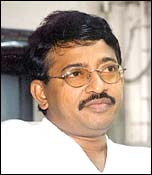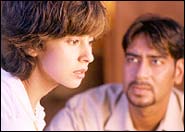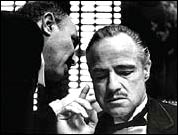Home > Movies > Interviews
The Rediff Interview
'I find it irritating to watch my films'
Raja Sen |
November 25, 2004
 Talking to Ram Gopal Varma is intensely surreal, and, as seen in the first and second parts of our Ramu Unplugged series of conversations with Raja Sen, provides extremely interesting food for thought.
Talking to Ram Gopal Varma is intensely surreal, and, as seen in the first and second parts of our Ramu Unplugged series of conversations with Raja Sen, provides extremely interesting food for thought.
In this final sequence, the director talks about his favourites among his own films, and the ones he feels indebted toward.
As a director so passionate about screenplay and dialogue, when do we see a Ram Gopal Varma comedy?
Right now, it's not at the top of my head. The films I've decided to make over the next couple of years are very different. Comedy doesn't quite fit in there.
 | More on rediff.com! |  | |
|
So you could actually hear a joke you really like, and make it into a film?
Yeah, I'll do that. I will do that (smiles).
Can you tell us about your current subjects under progress?
I'm working on a script on the media. My thought on it is that the media is a reporting agency: it reports news. News is what is new. And what is new is what we hear for the first time. So the desperation of telling it for the first time is what the newspapers and the channels are in competition for, for the TRP ratings, in order to get the ad revenue. So I want to make a film exposing the media.
'You see the media exposing, now see the media exposed' is going to be my line for that. I'm going to call it Commercial Break.
Will you direct that yourself?
I don't know. Depends on the time I have, my mood. If I find a guy who I think might be better than me, it's his. I believe Vaastu Shastra is better than Bhoot because I saw the script a certain way, and I think Sourabh (Usha Narang, director) has done it better than me.
Maybe Bhoot wasn't scary for me because I made it. Vaastu Shastra was made by him, so I got more scared, and I really meant it when I called it scarier.
And Bhoot had an advantage: you hadn't seen a horror film for a very long time. So it came out of the blue, and hit right on target. Vaastu Shastra didn't have that advantage, because lots of horror films have been coming the last two-three years.
Was it an inside joke calling a horror film Bhoot?
I think anything you put upfront, a word, like Bhoot, is effective.
Now, I want to make a film called Chudail. I just like to take one mass-y word, Chudail, and give it a classy twist by treating it stylistically. Say anything, but with conviction and pride. How seriously you eventually take it depends on the value you give to it.
Are we ever going to see a Ram Gopal Varma Box Set on DVD or something? Because it's such an unexplored format in terms of India, and there's so much insight the added features could give your fans. Commentary, deleted scenes etc will enhance the film.
(Nods, smiles) That's actually a very interesting idea. I'll have to look into it, I don't know who owns which rights of which of my films, but it's worth looking at. An interesting idea indeed.
The problem is I don't have respect for the films I make, after I've made them. I detach myself and get embarrassed when I watch them later. After the first copy comes out, I lose interest in the project. Then I only have an interest in the audience, and their feedback: liking it, disliking it, finding meanings I didn't intend. I listen to these reactions. After that, if I ever catch my films on television, I change channels. I find it irritating to watch them.
 Which of your films do you personally prefer over the rest?
Which of your films do you personally prefer over the rest?
(Smiles) I like some moments in my films. Some moments in Satya, Company, Rangeela, and even Daud. And Bhoot. Any film, whether it worked at the box office or not, I'll have my favourite moments from it.
For me, I say directorially, Bhoot is my best film, because what is directing about? You have material, you have a script. Then you cast actors, use the medium -- camera, music, sets -- to enhance the effect.
Company has material, Bhoot doesn't have material. 75 percent of the film is just two people: Ajay Devgan goes to office, comes back, Urmila Matondkar sits at home, watches television. And all that time, you're playing with the psychology of the mind. That is what direction is all about: creating a vision about the nonexistent thing.
Company has material, it was about creating the packaging. It had very serious material, characters and relationships. Even if you tell the story of Company, it's a proper plot – it'll hold you.
But holding the viewer's attention, without having a story, is what directorial capability is really all about.
What kind of films do you like to watch?
In recent times, I've been most captivated by the film Requiem For A Dream. I rarely watch films, and today, films don't hold me, as my mind keeps running in different directions. I can't concentrate. The moment the film goes a little here and there, I lose interest. Or else I start editing the film (laughs), which spoils it for me. That's the sad part. Watching a film has become very technical.
You grew up watching movies. What were the big influences while you still devoured cinema?
I lived in the theatres. A very bizarre selection of films influenced me, actually, from Enter The Dragon, to Peter Seller's Pink Panther series to McKenna's Gold to Chori Mera Kaam, to Himmatwala with Sridevi and Jeetendra; to The Godfather, even Kalyug. All kinds of films.
 You mentioned The Godfather. Just how much does Sarkaar owe the (Francis Ford) Coppola classic?
You mentioned The Godfather. Just how much does Sarkaar owe the (Francis Ford) Coppola classic?
Let me put it this way: if The Godfather hadn't been made, Sarkaar wouldn't have been made. That is the truth.
The similarity of the stories is that of a powerful family who has the clout to work outside the system. The difference is The Godfather is about a criminal organisation, and Sarkaar is not a criminal. He's a powerful political figure -- there are a hundred people like that in India, maybe even a thousand. All of them will have similar stories. This identification factor makes it a strong film.
I'm sure I'll be paying homage to a lot of incredible scenes from the film, but the basic story is not that of The Godfather.
When you say paying homage – you've grown up watching this eclectic collection of cinema – do you ever cinematically pay homage to them in your other films?
I do that all the time. Every film I make is actually only that. I don't think I create anything original. I would just do it as it relates to that particular story, to that particular context. To today.
So Naach is a homage to what?
Naach, actually, is my most original film. You won't see a relationship with any film. Sarkaar you'd see that; Bhoot obviously; Rangeela also – somewhere, I mixed parts of Sound Of Music with Basu Chatterjee's films and something interesting emerged. Naach, I think, is me at my most original -- in terms of subject matter, characters, and cinematically, the way it's shot.
Do check out the first and second parts of our Ramu Unplugged series. Also, read about Ramu talking about making it in cinema.